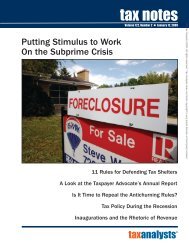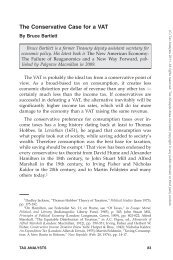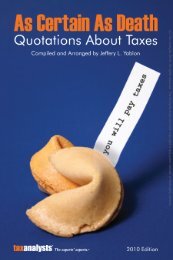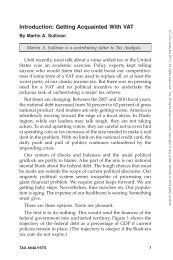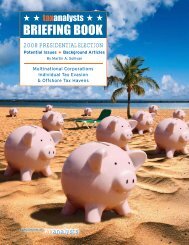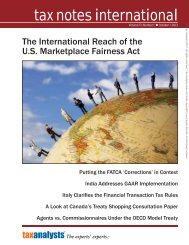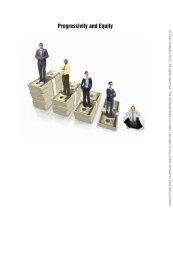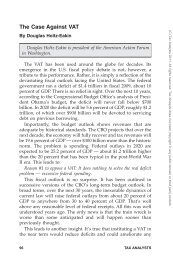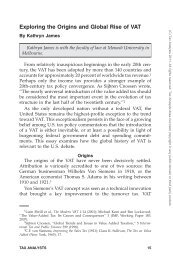Forty Years of Change, One Constant: Tax Analysts
Forty Years of Change, One Constant: Tax Analysts
Forty Years of Change, One Constant: Tax Analysts
You also want an ePaper? Increase the reach of your titles
YUMPU automatically turns print PDFs into web optimized ePapers that Google loves.
<strong>Forty</strong> <strong>Years</strong> <strong>of</strong> <strong>Change</strong>, <strong>One</strong> <strong>Constant</strong>: <strong>Tax</strong> <strong>Analysts</strong><br />
No one thought about financial intermediaries<br />
trading for their own accounts. We always knew<br />
we didn’t know how to measure their income<br />
properly, but as recently as in the first few years <strong>of</strong><br />
the 21st century, financial intermediation was not<br />
the main activity <strong>of</strong> the U.S. economy. Policymakers<br />
are still not thinking about how to tax<br />
banks and other financial intermediaries.<br />
The individual income tax has morphed into<br />
a consumption tax, and not in a good way. Most<br />
individuals have consumption treatment for savings<br />
in the form <strong>of</strong> retirement accounts. As the late<br />
economist David Bradford, another great friend <strong>of</strong><br />
<strong>Tax</strong> <strong>Analysts</strong>, cogently argued, a consumption tax<br />
is a tax on labor income. With capital gains rates<br />
<strong>of</strong> zero and 15 percent, and most dividends taxed<br />
at 15 percent if they are taxed at all, the income<br />
tax effectively reaches only labor income. And<br />
not even all <strong>of</strong> that, since many service partners<br />
enjoy capital gain treatment <strong>of</strong> what is essentially<br />
income from services.<br />
Enactment <strong>of</strong> a value added tax on top <strong>of</strong> the<br />
individual income tax would just put more <strong>of</strong><br />
the burden <strong>of</strong> government on households while<br />
removing it from businesses. As for individual tax<br />
reform, no reform is possible unless the mortgage<br />
interest deduction, which is now the largest individual<br />
tax expenditure, is eliminated. That step is<br />
now being discussed by a budget commission.<br />
Rich people are indignant that their efforts to<br />
hide from the tax collector are being probed after<br />
being winked at for so many years. They blame<br />
enforcement on revenue need, as if the point <strong>of</strong><br />
taxation were not revenue collection. But for the<br />
embarrassing information provided by Bradley<br />
Birkenfeld, however, no such crackdown would<br />
have occurred.<br />
We’ve had some small triumphs along the way.<br />
The investment tax credit is gone. The home mortgage<br />
interest deduction has been capped. Policymakers<br />
are beginning to ask whether the U.S. tax<br />
system should subsidize foreign investment.<br />
There are stupid decisions we are still fighting.<br />
Half <strong>of</strong> U.S. businesses do not pay tax at the entity<br />
level — which effectively means that their income<br />
is not properly measured and taxed. We couldn’t<br />
prevent the widespread adoption <strong>of</strong> the LLC and<br />
federal permission to treat it as a partnership. No<br />
natural law says that partnerships cannot be taxed<br />
at the entity level, as they are in many other countries<br />
and some states.<br />
Transfer pricing has become a newspaper pejorative<br />
for the entirely foreseeable consequences <strong>of</strong><br />
the foolish continuation <strong>of</strong> separate company accounting<br />
for the affiliates <strong>of</strong> large multinationals.<br />
Most American states now force combined reporting,<br />
and the European Union is working on it, so<br />
transfer pricing may well be gone in a decade,<br />
replaced by formulary apportionment.<br />
For years multinationals were disunited in their<br />
approach to taxation <strong>of</strong> foreign income, given<br />
their differing tax positions. Recent attempts to<br />
tighten the foreign tax credit appear to have united<br />
them. They are now lobbying for a quasi-territorial<br />
system with no strings, which would have them<br />
paying even less tax than they do now. So they are<br />
busy lining up academic support to give intellectual<br />
respectability to yet another tax cut.<br />
Isn’t it logical to cut corporate income taxes<br />
while properly measured unemployment is 16<br />
percent and people are being thrown out <strong>of</strong> their<br />
houses on the basis <strong>of</strong> faulty documents? We<br />
would perform a great public service if we could<br />
just convince our legislators that workers are not<br />
paid out <strong>of</strong> after-tax pr<strong>of</strong>its.<br />
In the wake <strong>of</strong> the check-the-box rules, there is<br />
very little left <strong>of</strong> subpart F. As the current Treasury<br />
deputy assistant secretary for international affairs<br />
has stated, American multinationals enjoy<br />
a do-it-yourself system combining transfer price<br />
manipulation, deferral, transmutation <strong>of</strong> income,<br />
and generous foreign tax credits that is better than<br />
exemption. As this article is being written, multinationals<br />
are lobbying for repatriation relief once<br />
again because they have succeeded in stashing so<br />
much money in havens.<br />
We conclude with a partial list <strong>of</strong> the dumbest<br />
things Congress and tax administrators have done<br />
in the past 40 years:<br />
• 1981: Safe harbor leasing<br />
• 1984: 60/40 treatment for futures contracts<br />
• 1986: Alternative minimum tax<br />
• 1988: Limited liability companies as partnerships<br />
• 1996: Internet <strong>Tax</strong> Freedom Act<br />
• 1997: Check-the-box rules<br />
• 2001: Individual tax cuts<br />
• 2005: Repatriation<br />
21




